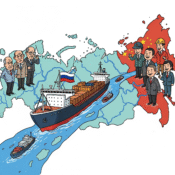Trump and Putin: A New Chapter in U.S.-Russia Relations?
In a pre-announced turn of events, U.S. President Donald Trump is spearheading a bold initiative to normalize relations between the United States and Russia, even as the war in Ukraine is locked in a never ending cycle with Russia holding thee upper hand. While many have dismissed the idea as improbable, Trump’s recent overtures suggest he is serious about brokering a deal to end the conflict—a move that has left Europe feeling abandoned and questioning America’s long-term strategic priorities.
Trump, known for his unorthodox approach to diplomacy, has long expressed admiration for Russian President Vladimir Putin, often praising his strongman leadership and pragmatic worldview. Now, it seems Trump is leveraging that rapport to push for a resolution to the Ukraine war, even if it means sidelining European allies in the process. Critics argue that Trump’s efforts amount to a betrayal of Europe, as he appears more focused on securing U.S. interests and pursuing expansionist objectives elsewhere, rather than upholding the transatlantic alliance.
The president’s approach has been met with awe and sadness, particularly in Europe, where leaders are not accustomed to Trump’s unpredictable style. Many view his negotiations with Putin as a dangerous gamble, one that could undermine Ukraine’s sovereignty and embolden Russian aggression. Yet, Trump seems undeterred, framing his efforts as a pragmatic solution to a conflict that has dragged on for far too long. “The war in Ukraine is a disaster for everyone involved,” Trump reportedly stated in a recent private conversation. “It’s time to end the bloodshed and focus on what really matters—America’s future.
”Trump’s critics, however, see his actions as a calculated move to advance his own agenda at the expense of global stability. By prioritizing U.S.-Russia relations, Trump is effectively signaling that Europe’s security concerns are secondary to his vision of a reshaped geopolitical landscape. This shift has left European leaders feeling isolated and betrayed, as they grapple with the implications of a potential U.S.-Russia détente.
For Putin, Trump’s overtures represent a rare opportunity to reset relations with the USA and ease the economic and political pressures that have mounted since the invasion of Ukraine. The Russian president has long sought to exploit divisions within NATO, and Trump’s willingness to engage directly with Moscow plays squarely into that strategy. If successful, the negotiations could pave the way for a new era of cooperation between the two powers—one that sidelines Europe and redefines the balance of global power.
Moreover, Trump’s critics argue that his approach risks legitimizing Russian aggression and rewarding Putin for his destabilizing actions. “This isn’t diplomacy—it’s capitulation,” one European diplomat remarked. “Trump is selling out Ukraine and Europe for the sake of his own legacy.”
As Trump and Putin continue their dialogue, the world watches with a mix of hope and trepidation. While the prospect of ending the Ukraine war is undeniably appealing, the cost of such a deal—both for Europe and for the principles of international law—remains uncertain. What is clear, however, is that Trump’s efforts mark a dramatic departure from traditional U.S. foreign policy, one that could reshape the global order in ways we are only beginning to understand.
Whether Trump’s gamble will pay off or backfire spectacularly remains to be seen. But one thing is certain: his negotiations with Putin have already sent shockwaves through the international community, leaving allies and adversaries alike scrambling to adapt to a new and unpredictable reality.



